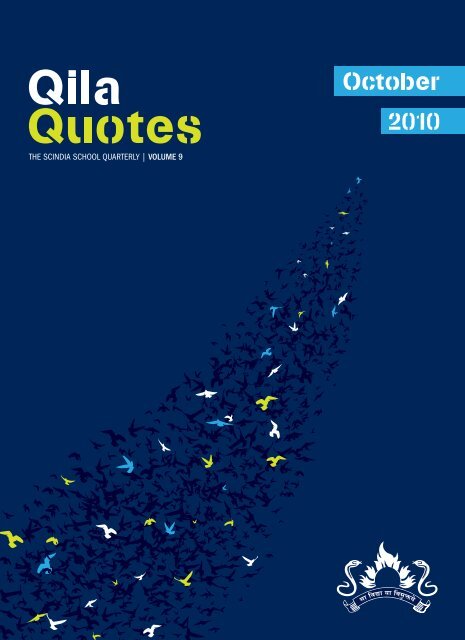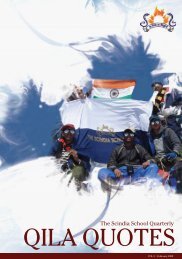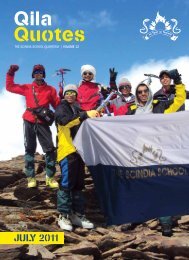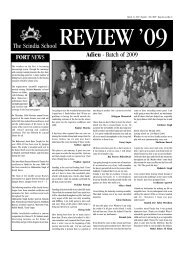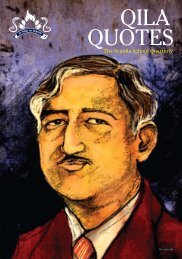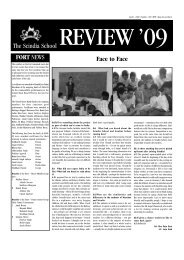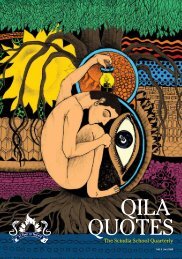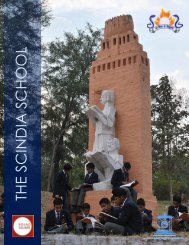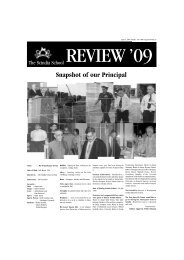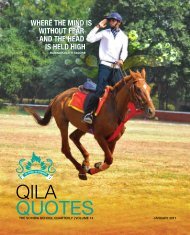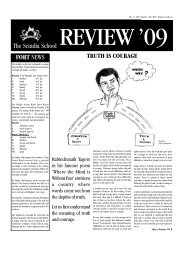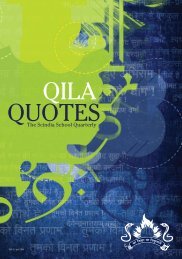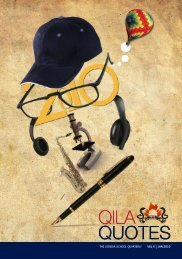15th October 2010 - The Scindia School
15th October 2010 - The Scindia School
15th October 2010 - The Scindia School
- No tags were found...
Create successful ePaper yourself
Turn your PDF publications into a flip-book with our unique Google optimized e-Paper software.
QILA QUOTES | <strong>The</strong> <strong>Scindia</strong> <strong>School</strong>Principal's DeskFrom the beginning of the Diwali Term leading up to ourFounder’s Day celebration is always an exciting period. It isa time for change for the students and teachers in termsof new classes, new books and new curricula to handle.Principal Mr. Samik Ghosh giving a speech on the occasion of Independence DayMr. Samik GhoshPrincipal, <strong>The</strong> <strong>Scindia</strong> <strong>School</strong>"Amidst all these excitements Ido miss the cheerful and naughtyfaces of the batch that passed outin March. I am happy to note thatthey are doing well in variouseducational institutions."<strong>The</strong> teachers returned ready to take on the challenges after a three day offsite programmein Bhopal. Approximately 128 new students and 7 new teachers joined the <strong>Scindia</strong> familyand I wish them fulfillment of their cherished dreams and goals as they go through theirlives on the Fort.<strong>The</strong> <strong>School</strong> buzzed with activities. Our students went out to participate in IPSC and othercompetitions. It was a delight to host two major competitions that brought the studentsand teachers from different schools to the Fort. <strong>The</strong>se variations from our regular routineare needed from time to time. Many eminent people from different walks of life visited usduring this period.We have acquired a new bowling machine and an artificial surface for the Cricket nets togive our boys a taste of the pace and swing of Shaun Tait. <strong>The</strong> clinics for Tennis and TableTennis provided the necessary boost to these games. A set of young and enthusiasticcoaches have livened up the games sets. <strong>The</strong> morning fitness programme is here to stay.We have taken up several measures to revamp the Round Square activities.Amidst all these excitements I do miss the cheerful and naughty faces of the batch thatpassed out in March. I am happy to note that they are doing well in various educationalinstitutions.Principal Mr. Ghosh during a lunch for the 'shramjeevis' on Gandhi Jayantivolume 9 | oct <strong>2010</strong>
QILA QUOTES | <strong>The</strong> <strong>Scindia</strong> <strong>School</strong>Editorial<strong>The</strong>re is an air of excitement as the <strong>School</strong> prepares for its biggest carnival, the 113thFounder’s Day. <strong>The</strong> first term exams for Classes IX to XII having got over, the hobby classesand practice for the cultural program has begun in full earnest. <strong>The</strong> students are busymultitasking- juggling studies with the various other events that they are involved in.<strong>The</strong> DEAR programme in actionA still from the Janmashtami play 'Jarasandh Ka Vadh'A sample nursery has been madebehind the OAT to show the varietyof plants available on the Fort.In a few years when these growthey’ll give a beautiful backdropto the OAT. All the channels thathad been opened to fill the ‘taals’worked effectively this monsoonand have filled these up to the brim.It is expected that the Fort will notencounter water problem afterthis. <strong>The</strong> third Sewage TreatmentPlant (STP) has been commissionedbehind Shivaji and Madhav houses.<strong>The</strong> Career Cell organised anumber of visits by professionalsthis term to enable the students ofClasses XI and XII fill up forms foradmissions to foreign universities.<strong>The</strong> students of Class X underwenta career identification test followedby a one to one counselling. <strong>The</strong>ywere also put through an aptitudetest to help them decide thesubjects they should choose afterClass X and beyond.Academics<strong>The</strong> new academic year began with a lot of enthusiasm andpromise which was, as every year, generated at the Offsiteprogramme for the faculty.Very soon thereafter the schedule and structure of EnglishEnhancement classes was finalised by the English facultywith the Vice Principal. Two important components ofthis initiative were ‘Fun Activities’ and remedial sessions,especially for the young learners of the Junior <strong>School</strong>.Over the next few weeks these classes took a firm holdand managed to make an impact on many students.Presentation of skits has been a direct outcome of thisinitiative that has found a ready audience. Some seniorstudents have been attending these classes regularly too.<strong>The</strong> Mathematics remedial sessions at the junior levelare steadily but surely helping raise basic competenceof students in the subject. Thanks to effective use of theMathematics lab some of our younger students havedeveloped a new found interest in the subject.<strong>The</strong> Science faculty has been getting various stimulatingprojects done by groups of students utilising Project andEnquiry based learning methodologies<strong>The</strong> Social studies department after its first interaction withthe Learn Today team has begun implementing variousideas and suggestions.<strong>The</strong> Hindi department has revamped part of the curriculumat the junior level and has also adopted some newapproaches to teaching.<strong>The</strong> publication of the second issue of the French magazinehas done much to raise the interest level in the languageamong many students. <strong>The</strong> German department continuesto be active as usual.InitiativesAs a small step to minimise pollution on the Fort Tuesdayshave been marked as ‘No Vehicle Day’. This is a studentdriven idea to which the staff responded with enthusiasm.<strong>The</strong> suggestion for this had come from the students andthe staff responded positively to it. <strong>The</strong> students of JuniorHouses also walk down to the school on that day forclasses and meals.<strong>The</strong> DEAR (Drop Everything and Read) programme has beeninitiated by the English Department to give a greater thrustto reading of books. On the first and third Monday the lastfifteen minutes of the first period are set aside exclusivelyfor reading. This is a small step to kindle an interest forbooks in children.<strong>The</strong> Library Committee has initiated the reading of BookReviews in the Wednesday Assembly.Visitors<strong>The</strong> <strong>School</strong> is playing host to Bryce Leske from WaggaWagga Australia who has come as a GAP student fromthe organisation Lattitude Global Volunteering and will bestaying here for a period of five months.We are also happy to have amidst us Ms Laura Telep who ison a Fulbright Teacher Exchange with Mr Tarun Seth. Laurateaches at Lowell High <strong>School</strong> in San Francisco, California.In <strong>Scindia</strong> she is teaching Mathematics to students ofClasses VIII and IX. She is doing workshops for the variousdepartments on learning through enquiry.CelebrationsAs the <strong>School</strong> is deeply rooted in Indian culture all thefestivals were celebrated with great enthusiasm. <strong>The</strong>entire school community enjoyed the religious fervour onJanmashtmi and Ganesh Chaturthi.Independence Day was observed with great regaliacomplete with the horse riding team escorting the guests,impressive march past and the superlative performanceby the <strong>School</strong> Band. On Gandhi Jayanti a special astachalwas held. <strong>The</strong> Social Service League also organised aprogramme for the Shramjeevis.Competitions<strong>The</strong> <strong>School</strong> hosted the 37th All India Platinum JubileeMemorial English Debate, <strong>The</strong> Inter <strong>School</strong> Quiz and theMaharaja Madhavrao Memorial Hindi Debate. This year wewon all the three contests. <strong>The</strong> Platinum Jubilee debatewas conducted in three rounds and combined the Oxford,Turncoat and Cambridge formats of debating. This made thecontest a lot more challenging.ObituaryWith profound grief we mourn the sad demise of Mr ShareefAhmed who passed away on 7th August <strong>2010</strong>. Mr. Ahmadwho served the <strong>School</strong> from 1954 to1992 was a multifaceted personality. He taught English and History. He heldmany posts like incharge of the games department, cricketcoach, House Master of Shivaji house, incharge of theschool naval wing (NCC) and finally the <strong>School</strong> Bursar.May his soul rest in peace and may God give strength to thefamily to bear the irreparable loss.05 volume<strong>The</strong> Pilots escorting the Principal and the Chief Guest9 | oct <strong>2010</strong>
QILA QUOTES | <strong>The</strong> <strong>Scindia</strong> <strong>School</strong>Students'AchievementsJaskaran Singh Bakshi and Amar Pratap Rathod were the proud members of the GwaliorDivision U-15 cricket team which participated in the ‘All India Dr D.D. Sharma MemorialCricket Tournament’ which was held at Panchkula. Jaskaran Singh Bakshi was awarded‘Man of the Match’ in one of the matches.Old Boys' NewsOn behalf of his company M/s Aditya Flexipack, Raman Tandon (Ex Mj ’83) has won theNational Award in the Entrepreneur of the year category for medium scale industry. <strong>The</strong>award was given to him by the President Smt Pratibha Patil, at a function held at VigyanBhawan, New Delhi on 31st August <strong>2010</strong>.<strong>The</strong> <strong>Scindia</strong> <strong>School</strong> hosted and wonthe Maharaja Madhavrao MemorialInter <strong>School</strong> Hindi Debate. ShreyansAgarwal was adjudged the bestspeaker in the second round. Inthe final round of the same debateHarshit Krishna and ShreyansAgarwal were adjudged thefirst and second best speakersrespectively.<strong>The</strong> winners of the Limca Quiz<strong>The</strong> proud swimmers after the winKanak Saraswat of class XI bagged the first position in theInter <strong>School</strong> Declamation Competition organised by<strong>Scindia</strong> Kanya Vidyalaya.<strong>The</strong> <strong>School</strong> participated in the Gwalior round of LimcaQuiz. Out of the three teams which represented the <strong>School</strong>the one comprising Palaash Bhargava and Shantanu Bhatiawon the quiz.<strong>The</strong> team comprising Palaash Bhargava and SankalpRathour represented the school in the Inter <strong>School</strong> Quizorganized by the <strong>Scindia</strong> <strong>School</strong> and won it after a gap of afew years<strong>The</strong> <strong>Scindia</strong> <strong>School</strong> hosted and won the All IndiaPlatinum Jubilee Memorial English Debate for thefifth year in consecution. Aayush Tandon was adjudged thebest speaker in the Turncoat debate and the second bestspeaker in the final debate. Anirudh Sood was adjudged thebest speaker in the Oxford debate and Palaash Bhargavawas declared the best speaker in the Semi Final round.On the occasion of the Commonwealth Games the ‘ShoobhArts Group’, New Delhi is organising an All India ArtExhibition. <strong>The</strong> exhibition is divided into various categories,class wise. Six entries were sent from our school out ofwhich Jivitesh Mazumdar’s entry has been selected for theexhibition. <strong>The</strong> topic was ‘My Dream Sport’.Pranav Agarwal and Parth Mavai took part in the M.G.D.Hindi debate. Pranav Agarwal was adjudged the third bestspeaker and the school stood second out of nine schools.<strong>The</strong> <strong>School</strong> Rifle Shooting team participated in the 13th MPState Shooting Championship and 9th MP State Inter<strong>School</strong> Shooting Championship held at Daly College,Indore in which Raghav Ramraika and Varun Chadha wereawarded Bronze medals.A number of studentsrepresented the <strong>School</strong>in the IPSC IT Fest <strong>2010</strong>held at Mayo College Girls<strong>School</strong>, Ajmer.Results:Digital Ad Designing 1stShubhendra Vikram andKunwar KatochWebpage Designing 1stRohan Malhotra and VikramBenganiBrochure Designing 2ndPalaash Bhargava and SahajChawlaQuiz 3rd Aishik Ghosh andRohan MalhotraMultimedia Presentation3rd Manish Jain, PalaashBhargava and Nipun JainDigital Collage Making 3rdRitwik Kumar and TusharGarg<strong>The</strong> <strong>School</strong> participatedin the district levelswimming competitionand won 36 medals- 7gold,19 silver and 10 bronze.R.Parsuram (Ex Md ’68) has taken over as AdditionalChief Secretary of MP Government at Bhopal. We wish himgreat success.Nalin Mehta’s new book 'Sellotape Legacy: Delhiand the Commonwealth Games' (New Delhi: HarperCollins, <strong>2010</strong>) -- with Boria Majumdar -- was released on3rd September. It was on the top ten bestseller list withinits first week. It looks at the whole saga of the Games inits entirety -- on the mess of Delhi and also the largermeanings of the Commonwealth Games and India andindeed the Commonwealth itself. <strong>The</strong> book has receivedexcellent reviews and advance coverage in various outlets.Bharat Agarwal (Ex Jp ’05), who is pursuing MBA fromBalaji Management, Pune has recently released his firstbook ‘Love, Life and Ambition’. <strong>The</strong> story is about amagical boy, Ayushman, who has been sent to <strong>Scindia</strong><strong>School</strong> at a very tender age. <strong>The</strong> book is very interestingand will appeal to all young hearts.Mr Neeraj Lal (Ex Ja ’68) President SOBA NA hosteda get together for Anurag Kashyap and all the Toronto<strong>Scindia</strong>ns on 16th September. <strong>The</strong> evening was enjoyedby all. Anurag also invited all the <strong>Scindia</strong>ns there, as hisguests for the Toronto premiere of ‘That Girl In Yellow Boots’Everyone enjoyed the wonderful direction, music and actingand it was a unique experience for them. <strong>The</strong>reafter they allwent for dinner at the ‘THE HOST’ and had another party.Blood donation camps were organised all over thecountry by the regional SOBA chapters to pay homageand respect to HH Late Maharaja Madhavrao <strong>Scindia</strong>. Thisstarted on 30th September on the death anniversary of thelate Maharaja and continued on different days in the monthof <strong>October</strong> at various places. <strong>The</strong> members came out inlarge numbers along with their friends and families to makethe event a super success.Anurag Kashyap at the get together organised by SOBA North AmericaHH Maharaja Jiwajirao <strong>Scindia</strong> Memorial Panel Discussion took place on 30thSeptember at the Magnolia, India Habitat Centre, New Delhi. It was attended by about 70<strong>Scindia</strong>ns and their wives. <strong>The</strong> <strong>School</strong> was represented by the Principal who lead a team of8 with Mr. Bakshi, Mr. Bose and five students. Former Principal, Mr. N.K. Tewari and Mr. GKKapoor (former HM Jeevaji house) also graced the occasion.SOBA President Gen SPS Dhillon, who was the anchor conducted the entire evening withpanache. Each speaker spoke for 15-20 minutes and had rich and meaningful content toshare with the audience, A Q&A session followed. This was an enriching experience for alland they voiced their desire to make this an annual event, if not bi-annual. <strong>The</strong> discussionwas followed by cocktails and dinner which, as per Old Boys' tradition, continued beyondmidnight!Raman Tandon receiving the award fromR. Parsuram Chief Secretary ofthe President Smt. Pratibha PatilMP Government07volume 9 | oct <strong>2010</strong>
QILA QUOTES | <strong>The</strong> <strong>Scindia</strong> <strong>School</strong>AlumniENGLISH DINNERSA large crowd of boys was excitedly milling around the Notice Board outside the North BlockDining Hall. <strong>The</strong> object of their excitement was a notice announcing the serving of ‘EnglishDinners’. Every night about twenty boys would be served an ‘English’ meal. A fixed day ofthe week had been allotted to each group of twenty boys.Finally, the first course arrived, David being assisted by theever-smiling Shyam Bahadur Thapa, popularly known as‘Cartoon’. Bowls of steaming hot tomato soup, served withfloating bread croutons. Extra croutons were also placed onthe table in two small bowls. <strong>The</strong> soup was really good.Nandlal Rane(Ex – Vivekanand ’67)09Two ‘English’ dining rooms had been created out of the twostore rooms on either side of the passage connecting thekitchen to the main Dining Hall. ‘Vegetarian’ and ‘Nonvegetarian’were the signs affixed to the dining room doors.Each dining room had a table for ten.Apart from familiarising the boys with English cuisine, themain purpose of ‘English Dinners’ was to teach the boysgood table manners.It wasn’t that the boys were devoid of all table manners.Trying to tear a ‘chapatti’ using both hands, invited a swiftrebuke. So did placing of elbows on the table.However, sitting down with lightning speed and grabbing apot of ‘sada’ or mutton curry, though punishable if spottedby a Prefect, was generally overlooked. <strong>The</strong> moment thePrefect tinkled the little dining bell, there would be anexplosion of dragged chairs and the dining table wouldbe covered for two seconds with leaning bodies andoutstretched arms, laying claims to distant dishes.<strong>The</strong> plastic table covers also provided an excellent channelfor diverting spilled water to an unwary neighbour. Oncesome water had trickled into the neighbours lap it was goodmanners to say ‘pass it on’.<strong>The</strong> first time we went for ‘English Dinner’, we were greetedat the dining room door by Mehboob Khan, the senior mostwaiter, whom the boys had named ‘David’. He was dressedin a waiter’s uniform comprising white turban, white waiterscoat with brass buttons, white trousers and bare feet.David was a short, corpulent man, of darkish complexion,clean shaven with just a few white hair remaining on theback of his shiny, bald head. No one believed his claims toPathan ancestry. <strong>The</strong> boys had named him ‘David’ after theactor who perpetually played the role of ‘the good humoureduncle’ in Hindi films.<strong>The</strong> dining table was covered with a white table clothinstead of the usual plastic sheet. Knives, forks, spoons,side plates with folded white cloth napkins and glasses ofwater were neatly laid out in front of each of the ten diningchairs. <strong>The</strong>re were also plates with bread slices, small bowlswith tomato sauce, butter dishes, salt ‘n pepper cellars andjugs of water.Except for the jugs of water, which were the normal ricketysteel jugs, the serving dishes, including the cellars wereall white ceramic. <strong>The</strong> cutlery was engraved with a tiny‘Sheffield Steel – Made in England’.It soon became apparent that besides serving food, Davidhad been assigned the task of teaching the boys tablemanners. As a young man he had apparently worked inthe house of an English family and had picked up Englishdining etiquette along with a smattering of English.As we stood behind our dining chairs waiting for thePrefect’s bell to tinkle, David warned us ‘chair pulling, soundno making’.After we were seated, demonstrated instructions followed.“This spoon is ‘soup spoon’. Only soup drinking using.”“Only fork and spoon in mouth putting. Knife in mouth noputting.”‘This side plate only bread keeping.”“Eating no sound making. Eating mouth like this shutting,”he showed how to chew with a closed mouth.“Food in mouth, no talking”.He then went off to the vegetarian dining room for a repeatperformance.Next came the main course of roast mutton chops withgravy, green peas, mashed potatoes and potato chips. <strong>The</strong>rewas also a cucumber, carrot and tomato salad.For many of us, it was the first time with knife and fork, andwe found it difficult preventing the mutton chops from flyingoff our plates, let alone picking any food off them.Most of the boys did not like the taste of the boiled peas;David added a blob of butter and some salt and pepper tothe peas. “Now good tasting”, he said.<strong>The</strong> second course, understandably, took a long time tocomplete. At the end of the course, David showed howto keep knife and fork side by side. “Knife and fork nocrossing”.Finally, came the dessert, the popular strawberry jelly withcustard.Once dessert was over, David asked everyone to fold thenapkin and keep it on the side plate. He then usheredeveryone out of the dining room. Outside the dining room,we found the main dining hall in darkness, the rest of theboys having departed long before. Even the vegetarianEnglish diners, had left some time ago as they had had totackle less onerous vegetable cutlets.<strong>The</strong> English Dinner menu would be changed every week.Mashed potatoes, potato chips and salad were a constant.Soups varied between tomato and mixed-vegetable soupsof the ‘clear’ or ‘floating’ varieties.Non-vegetarian dishes included egg stew, roast / braisedmutton and fish / mutton cutlets. Those days, the poultryrevolution was still a few years away, and chicken, costingthrice as much as mutton, was an unaffordable luxury.Captains and colour holders during the annual Sports Banquetvolume 9 | oct <strong>2010</strong>Boiled vegetables, the least popular item, included boiledpeas / beans / cauliflower / cabbage.Though the food was bland, many of us developed a tastefor it and looked forward to the weekly English supper.<strong>The</strong> quality was excellent and would have done an Englishrestaurant proud!We later learnt that the crockery and cutlery had beengifted from the ‘palace’ kitchen and that the cooks hadbeen trained by the ‘palace’ chefs. We strongly suspectedthat Madhavrao, who had recently returned from England,was the architect behind the whole concept.I hope English meals are stillserved in school, for the tastes andtable manners acquired are veryrelevant in today’s globalised world,where one mingles and dines withWesterners or sometimes has achoice of only Western food.
QILA QUOTES | <strong>The</strong> <strong>Scindia</strong> <strong>School</strong>Faculty<strong>The</strong> 'Ma'ams' atTHE Fort“What’s in a name?That which we call a rose, by any other name would smell as sweet.”-William Shakespeare, Romeo and Juliet.Mrs. Vinita Pande<strong>The</strong> <strong>Scindia</strong> <strong>School</strong>Every public school has its own lingo; and <strong>Scindia</strong> isno exception. No lexicographer’s delight, this means ofcommunication has evolved over long years of usage,and consists of a smattering of Hinglish, slang and thecolloquial. It is meant strictly for the off-school hourswhen the boys get a chance to let their hair down. Thus ateacher’s pet is knows as a ‘Laggu’ while one who sneaks onother is known as a ‘Chulli’. <strong>The</strong> hog at the mess is known‘Hoddu’. Spinning yarns is ‘Fatte dena’ and bullying is ‘Waatlagana’. Juniors are called ‘J.B.s’and in retaliation seniorsare addressed as ‘S.B.s’ Gossiping is ‘Chat kholna’ andduring this a ‘gone case’ is referred to as a ‘Cheapaar’.With such exotic verancular, this school with an Indian ethosprefers to call its house servants as ‘Bhaiyyas’ and its housemaids as ‘Didis’ or ‘Bais’ <strong>The</strong>n why on earth do <strong>Scindia</strong>nscall their lady teachers as ‘Ma’ams’ ? This is an enigma thatdefies logic. To quote the balding bard once again:-“Nature hath framed strange fellows in her time”<strong>The</strong> Merchant of Venice”It was not always so. Way back in 1930 the blue bloodedmale bastion of Sardar <strong>School</strong> was pierced when Mrs.Pearce, nee Anusuya Devi Paranjpe, became the first ladyof the school. An accomplished educationist herself, sheplayed an active part in the affairs of the school, though shenever taught in the classrooms. She was called Mrs. Pearcein the school and Anusuya Bai in the local press. After<strong>Scindia</strong> <strong>School</strong> had been formed, in 1935 the name of alady teacher , Miss E.A. Palmer appeared in the civil list of<strong>The</strong> <strong>Scindia</strong> <strong>School</strong> for the first time. She taught English andEuropean languages. In 1937 Mrs. Malti Patwardhan, B.A.,travelled all the way from Rishi Valley school in Madras totake up the charge of house mistress of one of the JuniorHouses. None of these teachers was ever called a ‘Ma’am’.In the medieval times teachers were known as magisters.<strong>The</strong> very word strikes a cord of respect and authority. Itseems that as male teachers become less stern and ladyteachers softer, their titles too changed to milder titles.<strong>The</strong> word ‘ma’am’ is derived from the French ‘Madame’,literally signifying ‘My Lady’.<strong>The</strong> word ‘ma’am’ is becoming passe in the United Statesand Canada, and is out of common usage in Australia, NewZealand and England. Those who cling to the use of theterm tend to address only older women this way, while theyaddress the younger women ‘Miss’. Because of this agedivide most women object to the use of ‘Ma’am’ as there isno formal equal address for a younger man in common use.<strong>The</strong> innovative <strong>Scindia</strong>ns however seem to have worked theirway out of this impasse. <strong>The</strong>y refer to younger ‘ma’ams’ bytheir first names and the older ‘ma’ams’ by their surnames.Thus you have a ‘Puja ma’am’ and a ‘Sangeeta ma’am’ andyou also have a ‘Siriah ma’am’ and a ‘Pande ma’am’. <strong>The</strong>reis another very interesting offshoot of this whole business ofbeing a ‘ma’am’. When two ‘ma’ams’ talk to each other whatdo they refer to themselves as? Believe it or not but this istrue. If Mrs. Pande wants to borrow a teaspoon of curd fromMrs. Siriah they address each other as such. But if the topicof conversation veers to the school or the houses then theystart calling each other ‘ma’ams’.<strong>The</strong> campus cake however goes to the tall mustachioedsecurity guard.Mrs Ahilya Shinde directing a play at the SMOATIn olive green fatigues at the junior campus gatehe accosted the husband of one of ‘ma’ams’ livinginside with the query. “Sir ,aap koon see ma’am keSir ho?” <strong>The</strong> poor visitor who has been a sticklerfor the Queen’s English all his life was so takenaback that a head squarely stuck on his shoulderfor six decades suddenly seemed unstable.<strong>The</strong> heady fame was too much for him.ReferenceHundred years of <strong>Scindia</strong> <strong>School</strong>- by Dr.Sanjay MajupuriaWikipedia11volume 9 | oct <strong>2010</strong>
QILA QUOTES | <strong>The</strong> <strong>Scindia</strong> <strong>School</strong>ParentMrs PurnimaSavargaonkarMother of NeilSavargaonkar,class IXWORD POWERWe understand a ‘word’ as the smallest part of a sentence that carries meaning! We knowthat the meaning of a word is best conveyed only when it is roped in a sentence. So makingmeaningful sentences becomes our prime focus and we often ignore the deeper meaning ofthe words.Here I am presenting my real life experience with the word‘Try’ which is often used by the students.Dictionary meaning : To make an attempt to do something.<strong>The</strong> word is used in a sentence as : “I will try to…………..”In the middle of every academic term, I’d ask my son howmuch he would score in the exams and his standard replywould be to TRY to score 85% in all subjects.<strong>The</strong> month, and eventually the exams, would pass giving myson’s term results in our hand. He would have scored below80%.On being questioned what went wrong, he would answer“But I did TRY, mom”.On a quiet night I started a conversation with my son….Me: Son, today I thought of a small play, in which I will giveyou simple instructions and you will have to act on them.Ready?Son: Ready mom!Me: Son, reach the wall opposite you.He walked a distance of about 8 feet and reached the wall.Me: Come back.He did.Me: Now, TRY to reach the wall.He again walked with the same pace and reached the wallwithin the same time.He was discerning enough to make out that in trying I hadbeen slow and seemed quite disinterested in reaching thewall. <strong>The</strong>n I asked him how he had felt while TRYING toreach the wall. He answered that he felt he was at the task.He also acknowledged that though he managed to hit thetarget it happened at a much slower pace when he wastrying.Now I asked him if he understood the difference in thesentences “I will do a thing” and “I will TRY to do a thing”Both of us echoed the same ideas that when we say ‘I willtry’ we are hesitant to commit ourselves to achieve thetarget! We are defocused from the target, and are muchslower in our pace while walking towards it.Inspite of all the actions which an observer notices, as anactor we are satisfied with our efforts. I further added thatwhen we say “I will TRY” to a person who is giving us a targetto achieve, with full faith in our capabilities; we are simplyfooling ourselvesHe smiled with a twinkle in his eyes.Every term, every year, we would exchange the samesequence of dialogues and he would never cross thepercentage of 80!This used to bother me! I was not able to understand thereason behind his consistently mediocre performance inthe exams. <strong>The</strong>n I would start lecturing him about his truepotential vis-à-vis his lack of commitment in the exams. <strong>The</strong>poor child would go blank during my sermons, being unableto understand as to what was preventing him from realisinghis true potential. This used to fill me with the sense offutility of transferring data from one operating system toanother completely non-compatible operating system!Feeling restless, I did a deep introspection on ourconversation once. I realised that the word ‘WILL TRY’ usedby him every time was restricting him from attaining 85%. Idecided to make him understand this fact.Me: I did not ask you to reach the wall, son! I asked you toTRY to reach the wall!He came back to the starting point and got confused!Me: TRY, Son!He started walking at a slow pace, his eyes defocused fromthe wall and wandering around everything on the way.Me: TRY, Son, TRY to reach, do not reach directly.He paced even more slowly. As he came close to the wall hehalted. I asked him to TRY again and again! After three tofour repetitions, I observed a sparkle in his eyes.At this point I made him sit on my chair and asked himto observe me while I acted out the same instructions of‘reach the wall’ and ‘try to reach the wall’. I acted in thesame fashion as he had done. <strong>The</strong>n I asked him whatdifference he had noticed in both my actions.When we say “I will do a thing”; our brain sees THE THING asa target, and starts moving towards it.When we say “I will TRY to do a thing”; our brain can notvisualise THE THING clearly, hence doesn’t take muchinterest in moving towards it and slows down our pace ofactions.So dear, do not stop your brain from visualising the targetby saying “I WILL TRY”.My son appeared burdened by the heavy discussionsession; but his misty eyes conveyed to me that he had gotTHE MESSAGE!From that day I hear less of “I WILLTRY” from my son and am waitingfor the day when he conveys hisunderstanding of this throughhis actions.Running hard to keep the flame burning13volume 9 | oct <strong>2010</strong>
QILA QUOTES | <strong>The</strong> <strong>Scindia</strong> <strong>School</strong>InterviewInterview of Bryce Leskethe GAP student from AustraliaR.J.-You are working in close coordination with theEnglish Faculty like co - teaching, going to the JuniorHouses for fun activities etc. What is your experienceduring these sessions?Rishabh Jain,Senior Editor, Review15R.J. - Tell us something about 'Lattitude' the programunder which you've come to India.B.L. - Lattitude is a global organisation that runs avolunteering program, to many countries, from SouthAmerica, Europe and Asia. It is very well run and organised.It encourages young people to involve themselves involunteer work around the globe. <strong>The</strong> placements that theyprovide the students are of top quality, ensuring that thevolunteer gets the best out of the experience. <strong>The</strong> interestedstudent pays a fee to the program and then everything isorganised for him. He just turns up and enjoys himself.R.J. - What made you opt for India? What and how muchdid you know about the country before coming here?B.L. - After my interview with Lattitude, I was given thechoice of two countries - India and Canada. I wanted toexperience a country that was completely different fromAustralia; a country that would challenge, inspire, rewardand enrich. Canadian society is very similar to Australiansociety, and India has always been 'on the bucket list'so the choice was easy. <strong>The</strong>re is an aura of mystery thatsurrounds India, and it was a mystery that I wanted touncover. I didn't really know a lot about India, other than theusual tourist attractions. I knew they had amazing tea, crazyroads, busy cities, poverty and rickshaws, but other thanthat a lot was a mystery. And I like it that way - it allows meto discover and involve myself at a level that is beyond theeyes of a tourist.R.J. - Was <strong>Scindia</strong> your first choice out of the differentschools in India?B.L. - I wasn't given a huge choice of schools, but of theones that I was given, <strong>Scindia</strong> proved to be the pick of thebunch. Its history, location, opportunities and facilities madeit a very easy and exciting choice. I was counting down formonths. I was meant to come over with an English boy, butunfortunately he pulled out of the trip at the last minute. SoI braved it alone.R.J. - Did you get to talk to Joseph 'O Neil and JoshuaBowden the gap students who had come here fromAustralia last year?B.L. - Yes, I made contact with both of them. I met Joe at theLattitude camp, and spoke to Josh over email and phone.Both said that <strong>Scindia</strong> was a great school with loads ofstuff to do, helpful teachers and great students.<strong>The</strong>y gaveme some great advice regarding travel to India, and what tolook out for. <strong>The</strong>y loved India and are looking to come backin the near future.enjoying a game of football with the boysB.L. - I am now becoming more confident in teaching,especially the class VI. It's so much fun, but at the sametime challenging and hard work. I admire the teachersfor being able to do it all day everyday. <strong>The</strong> kids are soenthusiastic, although the odd one does fall asleep hereand there. <strong>The</strong> content is a little different from that ofAustralian English classes but the teaching methods arevery similar. I'm starting to really enjoy teaching, and gettingto know all the kids is great fun. However, rememberingnames is not so. <strong>The</strong> senior boys are great to hang outwith, while the juniors provide some enjoyable topics ofconversation, in cases where I can understand the accent.R.J.-Apart from English enhancement is there any otherarea where you'd like to involve yourself.B.L. - I love music, and have been playing the drums andpercussion for thirteen years. I am teaching Western drumkit to four boys at the moment, and loving it. In return theyteach me Tabla and Indian music. I'd love to get involvedin the percussion group, marching band, and have beeninvolved with the juniors during hobbies time. <strong>The</strong>re aresome great singers here, so perhaps a boys’ choir wouldn'tbe a bad idea. Sport is another big part of the school, and Ienjoy playing many. I can't play all sports well, but I can giveit a go. I'm enjoying water polo at the moment, as well asbasketball and the gym with the senior boys. It makes for agreat afternoon activity moving from one sport to another.R.J. - What do you feel about the <strong>Scindia</strong>n way of life andwhich <strong>Scindia</strong>n habits would you like to inculcate in yourown life?B.L. - Overall it is a very pleasant lifestyle. <strong>The</strong> days are verylong, especially for the junior boys, but they are structuredwell. I enjoy the sports time in the afternoon, with study inthe morning - that's when we're most fresh. <strong>The</strong> days go veryquickly, with lots to do and see. <strong>The</strong>re is an incredible senseof hierarchy here, however, and this is very different fromthe Australian way of life. I enjoy ‘Astachal’, and think that Iwould take back that time of reflection into my own life, aswell as the sport and rest time in the afternoon. Whether ornot it works will be another question.B.L. Bryce LeskeR.J. Rishabh Jainvolume 9 | oct <strong>2010</strong>R.J. - Lastly, if given a chance, what changeswould you like to bring in our school?B.L. - This is a tough question as mytraditions and values differ enormously insome aspects of life. However, to answer thequestion - I would change the time the boysget up in the morning to no earlier than say6.30 am or maybe even 7am.Sleep is veryimportant. I would like to encourage theboys to stop ordering the juniors around.Other than that the lifestyle, sense of schoolcommunity and family, the overall feel of theschool is very exciting, warm, encouragingand traditional. It is simply great!Having fun with the drums
QILA QUOTES | <strong>The</strong> <strong>Scindia</strong> <strong>School</strong>LiteraryA teacher I WOuld loveto be taught byEveryone in the society even the illiterate, know that the main purpose for the existenceof a school is to educate children. <strong>The</strong> term ‘education’ in the past had a very limitedconnotation. It generally referred to learning the three R’s (reading, writing and arithmetic).However, as time passed, the concept underwent a change.17Mayank KaseraXII CEducation now refers to all round development of a child.Today in addition to the mental (intellectual or cognitive)development of a pupil, his/her physical, moral, emotional,spiritual, social, aesthetic and even vocational developmentis emphasized in education. <strong>The</strong> task of a school and theteachers, therefore, becomes quite complex.A student spends 25,000 hours in the campus. <strong>The</strong>reforethe school must have the best of the teachers who have theability to teach, have a passion for teaching and a desire tobuild moral values in their students.“Teachers should be the best minds in the country.” In oneof his lectures, Dr. A.P.J Abdul Kalam fondly recalled thatwhen he was in class VIII his teacher Sri Shiva Subramniamlyer was once discussing the flight of a bird. After the classwhen young Kalam said that he had not understood thelesson the dedicated teacher took him to the seashore. InKalam’s own words “I enjoyed the roaring of the sea watergnawing at the sandy hills in the pleasant evening. Birdswere flying and chirping merrily. It was there that he mademe understand how birds fly”.So I would appreciate a teacher who does not get upsetor irritated when students fail to understand a concept.Instead he should keep devising new methods to simplifythe same till each student has understood it. I would lovea teacher who is clear about what is to be taught and whatcan be done without. In the present times any teachershould also be able to express himself in English as wellas Hindi; English because it is spoken worldwide and Hindibecause it is our national language.I am very sure that an idea can change one’s life! Soimagine the tremendous role of a teacher who for yearstogether fills our mind with ideas and expressions. <strong>The</strong>teacher should therefore be a repository of knowledge. Iwould like to be taught by a teacher who is well read andcan help me in choosing the right kind of books to read.I would like a teacher who has joined this noble professionby choice so that he does not feel compelled to teach, toeducate, to interact with young minds because I sincerelybelieve that it is a great privilege to stand before so manypeople and be listened to by them.I like a teacher who does not simply follow the syllabus butalso includes some useful rambling in the class because itis always a curious blend of these two aspects of teachingwhich makes real learning possible. We become completewith the help of the teachers who are caring, intelligent andhave tremendous patience to influence us the way theyperceive us in the years to come.I would love a teacher who could teach me leadershipqualities but at the same time ensure that I do not becomearrogant. He should teach me to treat everyone with dignity.It is often said that the battle of Waterloo was fought inthe playing fields of Eton. This means that Britain’s militarysuccess was based on the values taught to a school boy inthe public schools.J.Krishnamurti said “We are losing life, we are blunting thefeeling for beauty, the sensitivity to cruelty; we are becomingmore and more specialized and less and less integrated” SoI would remember a teacher who rather than making me aspecialist helps me to develop a harmonious personality.A teacher’s purpose is not to create students in their ownimage, but to develop students who can create their ownimage. He has a herculean task at hand. <strong>The</strong> expectationsfrom him are immense but the fruits of his labour are verysweet.An ideal teacher would be one who instills in his studentsgood values and succeeds in developing in them a spiritof inquiry not just for the various academic disciplines butalso for the marvels of nature.A geography lesson out of the classroomI would conclude by quoting a few lines from AbrahamLincoln’s letter to his son’s teacher where he wrote that“…Teach him, if you can, the wonder of books...But also give him quiet time to ponder the eternalmystery of birds in the sky, bees in the sun, and theflowers on a green hillside.Teach him to have faith in his own ideas, even ifeveryone tells him they are wrong. Teach him tobe gentle with gentle people, and tough with thetough of society…”volume 9 | oct <strong>2010</strong>
QILA QUOTES | <strong>The</strong> <strong>Scindia</strong> <strong>School</strong>LiteraryIndia’s In – DependenceAt the stroke of midnight on 14th August ’47, many children were born in free India. It wasthe much awaited day when the jubilant Indians resolved that in the years to come theywould prove their merit to the whole world.QILA QUOTES | <strong>The</strong> <strong>Scindia</strong> <strong>School</strong>ReminiscencesWhat do you miss the mostabout your school days?19Samridh AgrawalXII B<strong>The</strong>y would prove that despite more than two centuries ofdomination they still had the tenacity to establish theirgovernment and run it successfully. It was the moment ofvictory and the mood was optimistic. But as this midnightgeneration grew up and as things unfolded there were manywho began to doubt if India was actually a place wheregood things were possible. Many wondered if the dream ofour founders was alive and some questioned the power ofdemocracy.Several years of British rule had influenced the Indianmind so much that we were condemned to several yearsof misrule. <strong>The</strong>y had created a class of persons Indian inblood and colour but English in taste, in opinions, in moralsand in intellect. In the early years of independence wetried to transform a land which had a rich culture to a landof western modernity. Thus with our policies of top downplanning, heavy industries and elite colleges we were ableto create grand projects and Nobel Prize winners but basicrural education and health was neglected. <strong>The</strong> situationturned worse because our bureaucrats got involved in allsorts of malpractices and our MPs and MLAs became likeweapons of mass destruction while the Indians languishedin abysmal poverty.Gandhiji taught us the values of non-violence and truth butwhat he failed to teach us was how to achieve, what we callthe ‘larger societal objective’ and hence we have Indianswho can keep their homes clean but not their streets.Narrow parochial interests have blinded the people fromseeing the bigger national picture. One example of thisis Kashmir, the crown of India, which is simmering. Thisheaven on earth has been turned into hell by the bulletsof CRPF, violence by the stone pelters, angry or at timesagonised cries of women and children. Every year on <strong>15th</strong>August when New Delhi is absorbed in the tricolour andtriumph of independence, Kashmiris clamour for freedomfreedomfrom fear, freedom from constant bandhs andcurfews that paralyse the city and freedom from disruptedsupplies of food, fuel and medicines. Every year we havea list of promises coming from the ramparts of the RedFort. However these platitudes do nothing to alleviatethe suffering of the Kashmiris nor do they ameliorate thecondition of our famished and exploited populace.Indians were enslaved by the British for more than twocenturies, then by their own corrupt bureaucrats and nowfinally by the paralysed education system and capitalisticeconomy.India is the 11th largest economy of the world but what isso good about this rank if it can’t ensure two square mealsto the common man? What is so good if it can’t ensure that40% of our people don’t live below poverty line and another20% still don’t depend on thumb impressions for their basictransactions?We must realize that carving new states is less importantthan making state universities. Innovation, imaginationand creativity that can bring the best out of any student donot have importance in our education system. Hence weunfortunately continue to create a second rate society offollowers rather than creating change inducing leaders.Why is that we can see a real Indian only on the border orduring a match between India and Pakistan? Where doesall the national spirit go once we are on the streets blowingup public transport and disrupting public life? And then wehave people saying ‘Yeah India hai, yahan sab chalta hai’This lackadaisical approach will not work any more. Thingsmust change and for that first we have to change and wewill change.I have hope that this generation will challenge the prevalentapathetic attitude. I have hope that people will vote beforefaulting the political class. I have hope that our HRDministry will bring about some positive changes. May be Iam right and I live to see these changes. Or perhaps I amwrong. My optimism is misplaced and I am just, as they say,an IDIOT…Jai Hind, Jai BharatQuestion suggested byMrs Sujata Aslamvolume 9 | oct <strong>2010</strong><strong>The</strong> salty, spicy ‘lassi’ served to us when we were answeringquestions in the examination hall and the ‘pulao’ served atdinner on Wednesday evenings.John Singh (Ex-Sh ’55)All round development, teamwork and the secular spiritof the <strong>School</strong> viz:- from whining because of early reveille,to forced study for prep, dishes which taste same but arecalled differently, to monotonous classes, to afternoon restwhen you feel most energetic, to evening games one doesn’twant to play, to quiet ‘astachal’ prayers, to sleeping timewhen you don’t feel sleepy.Rajendra Kumar Shrivastava (Ex. Md ’70)Morning get up trumpet and ‘astachal’ in the evening, themajestic school building, the education, the cross countryrace around the Fort, vulture hunting near parapets andlastly parent like teachers.Tripurary Chaturvedi (Ex- Mj ’77 )I miss the discipline and the 'controlled environment' atthe school. I would attribute that to Mr. SP Sahi, the thenPrincipal. Life outside <strong>Scindia</strong> <strong>School</strong> is rather haphazard.<strong>The</strong> school gave us such a big sense of security and selfbelief.Rajiv Tyagi (Ex-Md ’79)I miss just about everything and that includes labour work,running for assembly after the long bell, cross country runsand coming back to school after holidays.Manish Newalkar (Ex-Jb ’89)I miss the luxury of a wholesome life of games, art,literature, the lectures, the dramatics, the friends, thegreenery and above all the youthful days spent in blissfulignorance of the difficult days ahead.Sridharan Rajan Ramkumar (Ex-Rn ’92)I miss my batch mates the most. A school without studentsis like a body without a soul. It’s not the inter-house footballmatches that I miss. It’s the team mates with whom I sharedthe field that I miss the most. <strong>The</strong> one's with whom I spentmost of my childhood and teenage years, with whom Ishared the victories and defeats.Harshvijay Amarnath (Ex-Ja ’97)Almost everything….From the ‘nihaari’ to the run up bellbefore the morning assembly, Bantu bhaiya's ‘kachori’for milk exchanges, "Wake Up Boys" in the morning andespecially eating ‘ber’ in winters, studying in the sun,crosscountry...there are so many things to miss.....Anushank Anand (Ex-Dl ’01)<strong>The</strong> student body is famous for cheering one of their own. Iremember the time I represented our school in the PlatinumJubilee Debate. <strong>The</strong> thunderous applause and cheering thatI heard when my name was called out was an experiencein itself. I knew that I had made a lot of people very proud.That euphoric feeling is something I miss the most.Shreyansh Divyankar (Ex-Ja ’05)<strong>The</strong> Football field, the view from the Fort, walking in the rain,the theatre (OAT), the sick room, the ‘ber’ trees, ‘astachal’,IPSC tours, the music room, the library, winter study camps,my cycling trip to Ajmer, elocutions. I could writea book on it.Nikhil Sharan (Ex Dl ’05)This is a tough question to answer because I miss everyaspect of school which includes friends, routine, cafeteria,Mess, ‘astachal’, Saturday movies, evening dress i.e.Kurta Pajamas, Common room etc. Most importantly,during the athletics, my group and I used to go aroundthe ‘khambataal’ to pluck tamarind and ‘ber’ etc. But trulyspeaking there are endless memories to be written about.Vedant Garg (Ex-Sh ’07)
QILA QUOTES | <strong>The</strong> <strong>Scindia</strong> <strong>School</strong>Fort FablesReviewReview is the <strong>Scindia</strong> <strong>School</strong> Newsletter and much more than that. It is an idea, a vision, aliving part of the <strong>School</strong>. Most magazines are directed at only one particular section of thereaders but the Review must have something of interest for boys of widely differing ages, forstaff members, for parents and for Old Boys.Editorial Board<strong>The</strong> <strong>Scindia</strong> <strong>School</strong>21<strong>The</strong> <strong>School</strong> Review is not just a catalogue of events inschool life. It also reflects the spirit of the school throughcreative participation by the boys and staff. It links us withour well wishers and friends and other sister institutions inIndia and abroad. It has also been a training ground for ouryoung journalists under the guidance of the staff editors.Between 1934 and 1936 there were fitful attempts atstarting a school magazine. In 1938 one of the teachers, MrMcMullen and student, Nandan Kagal, brought out a typedmonthly magazine and christened it ‘<strong>The</strong> <strong>Scindia</strong> <strong>School</strong>Review’. It came out in cyclostyled sheets and dealt mostlywith school activities, reports and current news. Finallyfrom August 1941, it started getting printed regularly as amonthly. It became a fortnightly feature in 1946 and theHindi section was added in 1948. Former Principal Mr. A.N.Dar’s dream was to make it a weekly.With the February <strong>15th</strong> issue, 1995 the Review startedgetting published through DTP on offset printing. This wasalmost a revolutionary development as it reduced the timetaken for editing, formatting and printing. Mr. Jawale whohas been providing Technical support since ’95 started theformatting on Ventura software and gradually changed toPageMaker and now it is printed on Indesign. <strong>The</strong> mastercopy is taken out in school and the subsequent copies aredone on offset machine by Deepak Printers in the city.<strong>The</strong> Review Editors are forever on the lookout for ideasto make it more popular. Hence often there are appealseliciting suggestions from the readers. All constructivesuggestions are incorporated in due course of time.In the 267th issue, a reader suggested adding two newportfolios to the editorial board that of the photographerand a cartoonist. <strong>The</strong> suggestion about the photographerwas considered impractical at that time because of theextra expenditure it would entail. However all boys wereencouraged to try their hands at cartoons. It was alsosuggested to start a junior section as it was felt that theReview caters almost solely for the Senior <strong>School</strong> andthe Junior <strong>School</strong> boys use it merely as book wrappers.<strong>The</strong>se and many more suggestions have led to a lot ofexperimentation with the format, layout and range ofarticles. At present a lot of Fort News, articles and reportsare supported by photographs and illustrations. <strong>The</strong> boysfrom Junior Houses also contribute to the Review and lookforward to the release of each issue. <strong>The</strong> content for eachissue focusses on the important events (school specific,national or international) of the Fortnight. A special issue istaken out on Founder’s Day.In 2008 on Founder’s Day we started with the quarterlypublication <strong>The</strong> ‘Qila Quotes’. This became an instant hitamong the <strong>Scindia</strong>n fraternity. After this the hard copy of theReview ceased being sent to the parents (who now receive asoft copy of it through mail) and Old Boys. A lot of Old Boysdo miss getting a hard copy of the Review though they keepthemselves updated by going to the school website wherethe Review is uploaded on the first and fifteenth of eachmonth. <strong>The</strong> positive side of this is that they can now readthe Review on the date of release rather than waiting for thepostman. Moreover it is an environment friendly move as wealso save a lot of paper.<strong>The</strong> student editors often spend long hours because ofthe tremendous work involved. However they manage tohave fun even in this. Probir Roy Choudhary (Ex Ja ’99)remembers how the best part of their responsibility wasto sit up late night in the staff editor’s house, reviewing,editing and marking up the articles and news updates. And,of course, as part of this process they’d get to munch onyummy grub, listen to music, etc.<strong>The</strong> Review Editorial Board hard at workAbir Pal( Ex Ja ’89) reminisces “Times were different whenwe were editors for the <strong>School</strong> Review. In those days theReview used to be an 8-10 page pullout: printed on flimsypaper (that easily smudged) using an antiquated (evenfor those days!) offset machine. I remember spendinglong hours proof-reading in a cramped printing room onthe ground floor of the main school building. <strong>The</strong> Review’sproduction quality may have left a lot to be desired butwriting for the Review was a thrilling and heady experience;comparable to what I felt in later years writing for nationalpublications like Times of India.”<strong>The</strong> student editors often wheedle a number of specialprivileges like outings and treats in lieu of the hard workthat they put in. Nikhil Prasad( Ex Ja ’03) says that themost outrageous thing he did in <strong>Scindia</strong> school wasinviting himself and the rest of the review team over to thevolume 9 | oct <strong>2010</strong>Principal's house for lunch without any notice. Mr. Tewarimost graciously indulged them and Mrs Tewari cooked up afantastic meal.From 2008 the strength of the Editorial Board has beenconsiderably increased with a view to involving morestudents in a journalistic exercise. <strong>The</strong>y graduate to a higherpost every year.Some of the outstanding writers that the Review has thrownup include Nandan Kagal, who became a journalist ofnote, Natwar Singh, Yeshwant Rajwade, Pawan Verma, AnupSahay, Dr Sanjay Majupuria and Anurag Mathur ( who wroteunder the nom de plume, Napolean Bonaparte, when inschool)
QILA QUOTES | <strong>The</strong> <strong>Scindia</strong> <strong>School</strong>Editorial BoardStaff Editor English Ms. Puja PantStaff Editor Hindi Dr. B.S. BhakuniMs. Raksha SiriahEditor in Chief Kartikeya K. BhargavaSenior Editors Tuhin PandeyRishabh JainUjjawal AgarwalArt EditorPratik BhalotiaAssociate Editors Aditya SharmaNeil SavargaonkarRohan SethPranav DarshanCorrespondents Manas PantSansrisht BhatiaSugandha ShuklaSaksham KapoorPhotography Mr. Dinesh SiriahDevyash GangwalSpecial Thanks Ms. Sujata AslamMr. R.K. KapoorMr. Jitendra JawleTHE SCINDIA SCHOOL<strong>The</strong> Fort Gwalior - 474008, MP, INDIA.Telephone : +91-751-2480750Fax : +91-751-2480650Designed by STUDIO PRINTstudioprint.in@gmail.com | +91 99100 90095Email : office@scindia.eduWebsite : www.scindia.eduOld Boys' Site : www.scindiaoldboys.com


